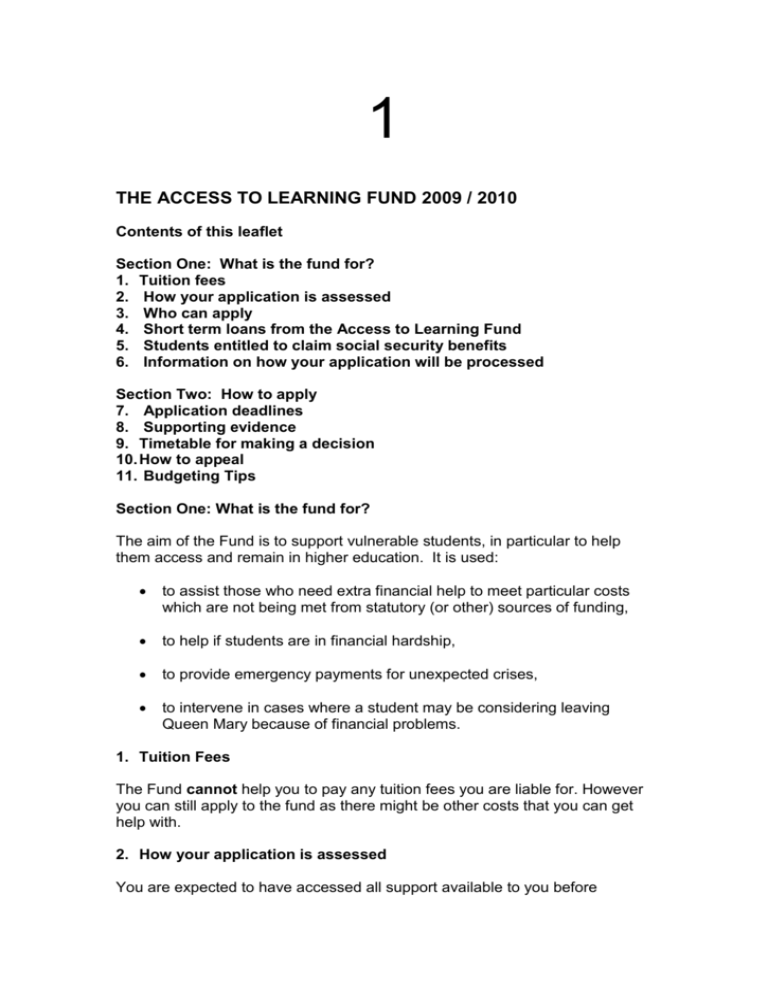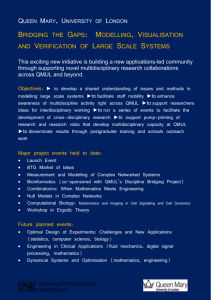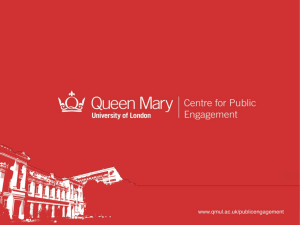Sample explanatory leaflet for students
advertisement

1 THE ACCESS TO LEARNING FUND 2009 / 2010 Contents of this leaflet Section One: What is the fund for? 1. Tuition fees 2. How your application is assessed 3. Who can apply 4. Short term loans from the Access to Learning Fund 5. Students entitled to claim social security benefits 6. Information on how your application will be processed Section Two: How to apply 7. Application deadlines 8. Supporting evidence 9. Timetable for making a decision 10. How to appeal 11. Budgeting Tips Section One: What is the fund for? The aim of the Fund is to support vulnerable students, in particular to help them access and remain in higher education. It is used: to assist those who need extra financial help to meet particular costs which are not being met from statutory (or other) sources of funding, to help if students are in financial hardship, to provide emergency payments for unexpected crises, to intervene in cases where a student may be considering leaving Queen Mary because of financial problems. 1. Tuition Fees The Fund cannot help you to pay any tuition fees you are liable for. However you can still apply to the fund as there might be other costs that you can get help with. 2. How your application is assessed You are expected to have accessed all support available to you before applying to the Fund including requesting your full student loan entitlement and making use of any overdraft facilities available to you. Your application will be treated either as a ‘standard’ claim or a ‘non standard’ claim or both. We will assess ‘standard’ applications under an ‘additional need’ method that looks at the difference between your accepted reasonable expenditure and your expected income. If you have unforeseen circumstances your application can then also be considered under a ‘non standard’ assessment. The assessment process for ‘standard’ and ‘non standard’ awards is designed to identify students who have particular financial needs and those who are in unforeseen financial difficulty. This should result in most of the available funding being directed towards students with a low income and those who have exceptionally high course-related costs. 3. Who can apply? Eligibility The Access to Learning Fund is for students who are eligible for UK government financial support for living costs. Eligibility for this depends on the status and duration of your residency in the UK or EEA. If you need further information on the residency rules please speak to a Welfare Adviser in the Advice and Counselling Service. International students and EU students who are only eligible for tuition fee support cannot apply to the Access to Learning Fund. Priorities for Assistance The Fund is there to help any eligible student who has a particular financial need but we cannot meet every application we receive and we cannot always meet all of the costs that you might apply for. The Government asks us to give priority to the following groups of students when deciding how to allocate the funding: For full time undergraduate students the priority groups are: Students with children (especially lone parents) Mature students, especially those with existing financial commitments, including priority debts Students from low income families especially those who do not receive a Queen Mary bursary Disabled students (especially where the Disabled Students Allowances are unable to meet particular costs) Students who have entered higher education from care Students from Foyers or who are homeless Students receiving the final year loan rate, who are in financial difficulty. For postgraduate students the priority groups are: Students with children Students who are self-funding Disabled students (especially where Disabled Students Allowances are unable to meet particular costs). If you are not in one of the priority groups you can still apply but you must provide as much evidence as possible to show why you have a particular need. NHS Bursary Holders Students who receive either a means tested or non-means tested NHS bursary are eligible to apply to the Fund. Students interrupting study or re-sitting out of attendance If you have not permanently withdrawn from your studies and you intend to return after your time out you are eligible to apply for help from the Fund, during your time out. Disabled Students Disabled students, especially those with dyslexia, can apply for help towards the cost of their preliminary diagnostic test, prior to applying for a Disabled Students Allowance. Before submitting your form, please contact the Disability and Dyslexia Service at Queen Mary (020 7882 2756). Students studying abroad Students spending a semester or year abroad as part of their course are still eligible to apply to the fund. You can download an application form from www.welfare.qmul.ac.uk. Postgraduate Students If you are a postgraduate student, you will be expected to show that you can meet your tuition fees and that you have made reasonable provision to support yourself through your course before we will consider your application to the Access to Learning Fund. 4. Short term loans from the Access to Learning Fund If you have not yet received your maintenance loan payment from the Student Loans Company at the start of term, because you have not yet received your financial assessment from Student Finance Direct, you can apply for an interim loan from the Access to Learning Fund. We expect you to repay this loan when your first maintenance loan instalment arrives. You should write ‘short term loan’ on the application form in Part 9 Non-standard Awards or Exceptional Circumstances if you are applying for a short term loan. 5. Students entitled to claim Welfare benefits Applicants are advised that payments from the Access to Learning Fund are unlikely to affect your benefit payments. Students who receive help from the Fund can request a letter from Lesley Green in the Bursaries, Grants and Scholarships Office to present to their local JobCentre Plus/Housing Benefit/Local Housing Allowance office to help them in claiming benefits if required. If you are claiming or think you may be entitled to Welfare Benefits, you may find it useful to make an appointment to see a Welfare Adviser. You can make an appointment by calling in person at the Advice and Counselling Service (Ground Floor, Geography Building or by visiting the website www.welfare.qmul.ac.uk or by phoning 020 7882 8717. 6. How your application is processed Queen Mary administers the Access to Learning Fund on behalf of the Government and assesses applications according to national guidelines as follows: Standard awards A standard award can help to meet general costs associated with being a student such as living costs like accommodation, food and utility bills and with course-related costs such as childcare, travel and books. For full time undergraduate students being assessed for a standard award there is an assumed income, set at a realistic level: £1616 per year for full year students and £539 per year for final year students. This assumes income from a number of sources including part time work, additional support from your parents or partner, bank overdraft, savings etc. For full time postgraduate students a weekly notional postgraduate income amount is used in standard assessments. This is set at £185 per week. For students with children or who are unable to work due to disability the amount is £154 per week. There is also a set expenditure level, known as Composite Living Costs, (CLC) based on state benefit amounts for general living costs such as food and usual household costs such as utility bills. The relevant amount will be set depending on your circumstances. CLC for 2009/10 are as below: Single student £104 per week, Student with partner £142 per week, Lone parent £104 per week plus £58 for each child. Non-standard awards If you have exceptional or unforeseen costs and you are in financial hardship as a result of these costs then you may be eligible for a non-standard award. Some examples of non-standard awards are as follows: repairs to essential household equipment, prescription costs for students on continuing medication, help with priority debts, emergency situations such as travel costs due to family illness or bereavement, being refused a student account with an overdraft facility, set up costs if re-housed in unfurnished accommodation, set up costs for students expecting a baby for the first time, students who are out of attendance but who need to retake exams. Students who are eligible for benefits over the summer vacation can apply for help to cover costs during the first three weeks of September when waiting for their student loan payment. These are only examples; if you feel your circumstances are exceptional you should apply. If you would like advice about how to present your application, you can make an appointment in person at the Advice and Counselling Service (Ground Floor, Geography Building) or by telephoning 020 7882 8717 or by visiting the website www.welfare.qmul.ac.uk. Section Two: How to apply If you think you might need to apply for help from the Fund we recommend that you apply as early as possible; you don’t need to wait until you have run out of money. If your circumstances change after you have submitted an application you can reapply to the Fund. Application forms are available from: Bursaries, Grants and Scholarships office, room CB2, Queens Building at Mile End or can be downloaded from our website: www.arcs.qmul.ac.uk/bursaries/alf.html Advice and Counselling Service, Ground Floor, Geography Building at Mile End, www.welfare.qmul.ac.uk Students’ Union in the Blomeley Centre, Mile End Campus. Student Office at Whitechapel. If you are unable to come in to College please email bursaries@qmul.ac.uk or telephone 020 7882 5079 and ask for an application form to be posted out to you. If you have special or unusual circumstances you may find it helpful to see a Welfare Adviser before submitting your application. You can make an appointment in person at the Advice and Counselling Service (Ground Floor, Geography Building) or by telephoning 020 7882 8717 or by visiting the website www.welfare.qmul.ac.uk. Alternatively, you may contact the Students’ Union in the Blomeley Centre. 7. Application Deadlines Applications for standard awards should be submitted by 7 May 2010. Applications for non-standard awards should normally be submitted at least 4 weeks before the end of your academic year but if you are a continuing student you can apply until 19 July 2010 subject to funds being available. 8. Supporting evidence You will need to provide supporting evidence with your application. We do not want originals – legible photocopies are fine. If for any reason we do need to see original documents, we will contact you. Applications that do not have the correct supporting evidence cannot be processed. We will return these forms to you, which will delay your application. The guidance notes on the application form will tell you what documents we need to see. We do ask to see bank statements for all accounts covering the previous 3 months, so if you think you may need to apply for help from the Fund, it is a good idea to keep these. Don’t worry if you have not got them, as your bank should be able to give you duplicate copies. 9.Timetable for making a decision. Provided you have completed your application form accurately and you have supplied appropriate documentary evidence, we will make an assessment and decision within 4 working weeks of submission. If your application is complete and has been received in the Bursaries, Grants and Scholarships office by Thursday afternoon then you will usually have a decision the following week after the ALF committee meeting. You should normally expect to receive a payment within 4 weeks. However in some cases we may need to defer your initial payment beyond 4 weeks to deal with a particular circumstance. If this applies, we will let you know in advance. If you are requesting an emergency loan or other short-term help, your application should be processed and paid within 1 working week. Depending on your situation, it may be processed and paid within 24 hours. 10 How to appeal We will notify you in writing about our decision. If you are not satisfied with the decision and would like your application to be reconsidered on the basis that you have further information which you did not disclose with your original application you may do so by writing to Lesley Green, Bursaries, Grants & Scholarships Manager within fourteen days of the date of the letter. Your application will then be reconsidered by the Access to Learning Fund Committee and you will be notified of the outcome by letter. If you have no further information to disclose and wish to appeal against the decision you may do so by writing to the Deputy Registrar within fourteen days of the date of the letter. Information on the grounds for appeal are set out in paragraph 2.150 of the College Appeal Regulations which can be found at the following link: http://www.arcs.qmul.ac.uk/policy_zone/college_appeal_regulations.pdf 11. Budgeting Tips Managing your finances as a student is very important. If you need advice about increasing your income and planning a budget please see a Welfare Adviser. You can make an appointment by calling in person at the Advice and Counselling Service (Ground Floor, Geography Building) or by telephoning 020 7882 8717 or visiting the website at www.welfare.qmul.ac.uk. Spend time planning and prepare a budget. Leaflets on planning a budget are available from the Advice and Counselling Service www.welfare.qmul.ac.uk . Be realistic when you list your income and essential expenditure. Keep a record of everything you spend – this helps identify regular and occasional spending patterns. Consider setting up standing orders and direct debits – they can help you plan and make consistent regular payments to all the places you need to without worrying about missing payment dates. Plan for extra expenditure such as start of year costs, special occasions, family birthdays etc. If you need to borrow money, use only interest free overdraft facilities. Get a student bank account if you have not already got one. Keep your bank statements, and check through them as they arrive. Try to shop in large supermarkets or local markets rather than more expensive convenience stores. Join NUS and take advantage of the discounts available to students. Try to be economical with utility services, such as heating, electricity and mobile phones to avoid running up large bills. Apply for a Student Oyster photocard from the Students’ Union or online at www.tfl.gov.uk. This entitles you to a discount when you use London Transport.









